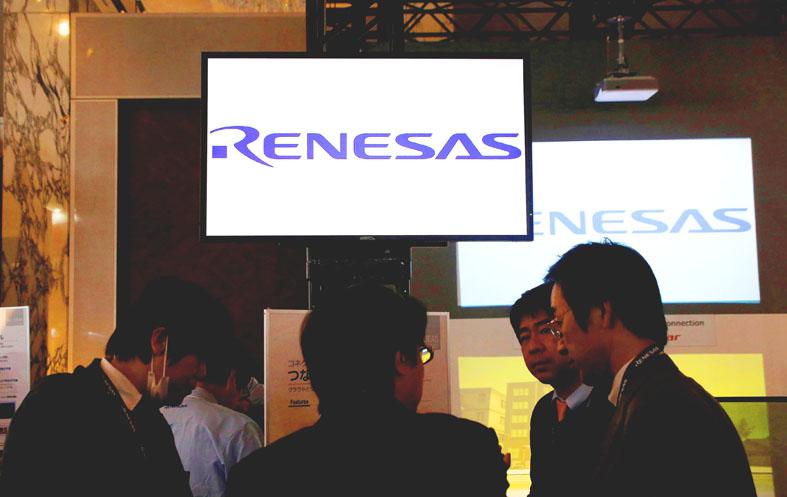Renesas Electronics Corp’s top executive warned that a global shortage of auto semiconductors might persist into the second half of this year, joining other industry leaders in bracing for a chip crunch to snarl production of vehicles and gadgets well past the summer.
Industry giants from Continental AG to Innolux Corp have in the past few weeks warned of longer-than-anticipated deficits thanks to unprecedented demand for everything from vehicles to game consoles and smartphones amid the COVID-19 pandemic.
Renesas is running its most critical plants at full capacity to try and sate demand, but there was no way of telling when the market might balance out, chief executive officer Hidetoshi Shibata told reporters.

Photo: Reuters
“Supply will remain tight through the first half of the year,” Shibata said this week. “And the way things look now, the situation will continue into the second half, but it’s anyone’s guess.”
Chipmakers such as Renesas and its partner Taiwan Semiconductor Manufacturing Co (TSMC, 台積電) are at the forefront of a global effort to plug a shortfall in supply of chips, the building blocks of a plethora of consumer products.
Automakers got hit first in part because of poor inventory planning and are expected to miss out on US$61 billion of sales this year alone.
Some analysts say that shortages could get mostly ironed out in the next few months, but the concern is that tight supply in certain segments — such as in more mature semiconductors where it takes time to build capacity — might eventually throttle the broader consumer electronics industry and jack up prices if it persists.
Semiconductors are now near the top of official agendas from Washington to Brussels.
Renesas, which vies with NXP Semiconductors NV and Infineon Technologies AG to supply automakers, is a prime barometer for the sector. It gets about half of its revenue from chips for vehicles and counts all the major automakers among its clients — Toyota Motor Corp, Ford Motor Co and Nissan Motor Co.
It also outsources some production of more advanced chips to TSMC, the world’s largest contract manufacturer.
Renesas’ 200mm wafer line on the southern island of Kyushu is operating near full capacity, while its 300mm fab in Naka, north of Tokyo, is in “overdrive.”
For every 40-nanometer microcontroller it makes at the Naka fab, it orders six from TSMC, a proportion that has not changed with the shortage, Shibata said.

Taiwan’s rapidly aging population is fueling a sharp increase in homes occupied solely by elderly people, a trend that is reshaping the nation’s housing market and social fabric, real-estate brokers said yesterday. About 850,000 residences were occupied by elderly people in the first quarter, including 655,000 that housed only one resident, the Ministry of the Interior said. The figures have nearly doubled from a decade earlier, Great Home Realty Co (大家房屋) said, as people aged 65 and older now make up 20.8 percent of the population. “The so-called silver tsunami represents more than just a demographic shift — it could fundamentally redefine the

The US government on Wednesday sanctioned more than two dozen companies in China, Turkey and the United Arab Emirates, including offshoots of a US chip firm, accusing the businesses of providing illicit support to Iran’s military or proxies. The US Department of Commerce included two subsidiaries of US-based chip distributor Arrow Electronics Inc (艾睿電子) on its so-called entity list published on the federal register for facilitating purchases by Iran’s proxies of US tech. Arrow spokesman John Hourigan said that the subsidiaries have been operating in full compliance with US export control regulations and his company is discussing with the US Bureau of

Businesses across the global semiconductor supply chain are bracing themselves for disruptions from an escalating trade war, after China imposed curbs on rare earth mineral exports and the US responded with additional tariffs and restrictions on software sales to the Asian nation. China’s restrictions, the most targeted move yet to limit supplies of rare earth materials, represent the first major attempt by Beijing to exercise long-arm jurisdiction over foreign companies to target the semiconductor industry, threatening to stall the chips powering the artificial intelligence (AI) boom. They prompted US President Donald Trump on Friday to announce that he would impose an additional

Pegatron Corp (和碩), a key assembler of Apple Inc’s iPhones, on Thursday reported a 12.3 percent year-on-year decline in revenue for last quarter to NT$257.86 billion (US$8.44 billion), but it expects revenue to improve in the second half on traditional holiday demand. The fourth quarter is usually the peak season for its communications products, a company official said on condition of anonymity. As Apple released its new iPhone 17 series early last month, sales in the communications segment rose sequentially last month, the official said. Shipments to Apple have been stable and in line with earlier expectations, they said. Pegatron shipped 2.4 million notebook